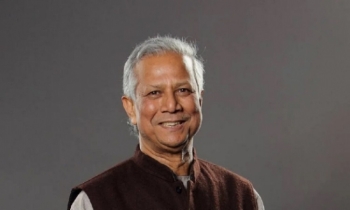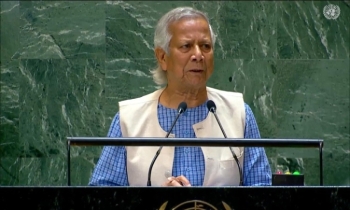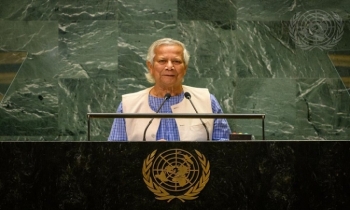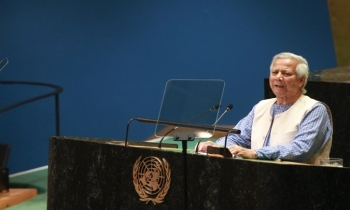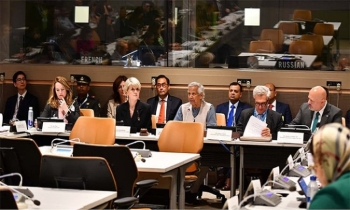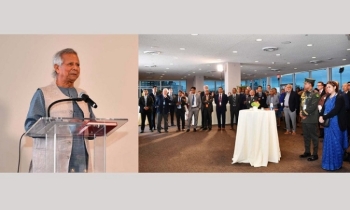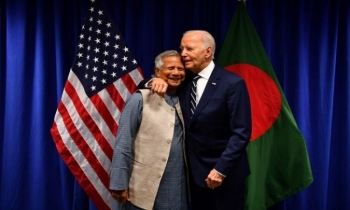PM seeks more international support to ensure Rohingya repatriation
UNB || BusinessInsider

Prime Minister Sheikh Hasina. Photo: File
Prime Minister Sheikh Hasina on Monday reiterated her call to the international community to do much more to ensure safe, sustainable and dignified return of over one million forcibly displaced Rohingyas from Bangladesh.
“Bangladesh has been hosting 1.1 million forcibly displaced Myanmar nationals. This humanitarian crisis poses a serious security threat,” the prime minister said in her recorded speech at the 78th Session of the UNESCAP.
“We expect enhanced focus and active support of the international community for safe, sustainable and dignified return of these displaced people,” she told the session meeting under the theme ‘A common agenda to advance sustainable development in Asia and the Pacific’.
She said that when the world is struggling to recover from the impacts of the Covid-19 pandemic, the Russian-Ukrainian conflict came as a huge blow to the global economic and social stability.
“The poor and developing countries are experiencing the brunt of the war. The war must be stopped immediately and joint actions are needed to tackle the situation,” she said.
She mentioned the pandemic battered the health systems and economies of most of the countries across the world where the poor and developing countries were the worst sufferers.
“In Bangladesh, while tackling the pandemic, we have tried to strike a balance between lives and livelihoods. Our timely and prudent interventions greatly helped manage the macroeconomic stability,” she said.
While many countries in South Asia experienced negative or nominal GDP growth, she said, we maintained a commendable growth during the pandemic.
She mentioned that Bangladesh is expecting over 7 per cent GDP growth in 2021-22.
“We have already brought almost all targeted population under vaccination,” she said.
Hasina said that Bangladesh has been recommended to graduate from the LDC status in 2026.
She hailed it as the global recognition of “the planned development journey that we have been following for the last thirteen years.”
“Our government has been working with the aim to transform Bangladesh into a knowledge-based developed and prosperous country by 2041.”
She mentioned that People are at the centre of the development pursuit.
“So are the SDGs. We have incorporated the framework provided in the SDGs to address the challenges of social inclusion, economic development, environmental protection and integration of ICT as enablers in all of our planned documents,” the premier said.
She mentioned that the government has been working diligently to build a hunger-and poverty-free Bangladesh which is the main theme of SDG-1 and SDG-2.
She mentioned that as the Chair of Climate Vulnerable Forum-CVF, Bangladesh has drafted the ‘Mujib Climate Prosperity Plan,’ with a vision of achieving energy independence, and setting Bangladesh's trajectory from vulnerability to resilience to prosperity.
She said Bangladesh sees regional cooperation as the most viable option for shared prosperity.
Bangladesh is engaged in different regional initiatives like SAARC, BIMSTEC, BBIN, BCIM-EC and Trilateral Highway, she added.
The PM said that establishment of the ‘South-South Network for Public Service Innovation’ helps Bangladesh’s experts to share their knowledge and experiences on various issues, including the SDGs.
In this regard, she said that Bangladesh is engaged in the Cross-border Paperless Trade, Asia-Pacific Trade Agreement, public-private partnership networking, renewable energy and other initiatives of UN-ESCAP.
“We gave support to ESCAP’s initiatives for the Asian Highway and Trans-Asian Railway and other approaches.”
She placed some proposals for ESCAP which are—
• Take action-oriented steps to facilitate collaboration in pursuit of knowledge and innovation;
• Request for International Support Measures to the graduating countries in a more pragmatic way;
• Assist member states to get united to pursue sufficient allocation of funds and technology for climate change victim countries.
• Enhance regional financial cooperation to improve regional crisis management capacity; and
• Leveraging ICT for employment generation and growth of IT, and IT enabled services to cope with the 4th IR.


